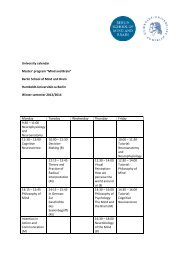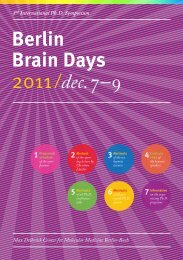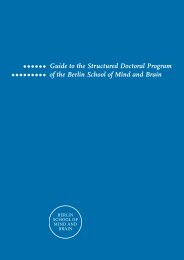Download - Berlin School of Mind and Brain
Download - Berlin School of Mind and Brain
Download - Berlin School of Mind and Brain
You also want an ePaper? Increase the reach of your titles
YUMPU automatically turns print PDFs into web optimized ePapers that Google loves.
Ryszard Auksztulewicz<br />
Recurrent Neural Processing in Somatosensory Awareness<br />
The characteristics <strong>of</strong> neural processing underlying conscious stimulus detection, despite<br />
extensive research, remain elusive. As a prominent theoretical account <strong>of</strong> visual<br />
awareness, the recurrent processing hypothesis states that while stimuli generally evoke<br />
feedforward activity propagating through the visual cortex, stimuli which become<br />
consciously detected are further processed in feedforward-feedback loops established<br />
between various stages <strong>of</strong> visual processing.<br />
Although this hypothesis has not been tested directly in modalities other than vision,<br />
monkey studies have provided indirect evidence for feedback processing in somatosensory<br />
detection. Here we applied dynamic causal modelling (DCM) to EEG data acquired from<br />
humans in a somatosensory detection task to test this theory. In the analysis, we focused<br />
on model-based evidence for feedforward, feedback <strong>and</strong> recurrent processing between<br />
primary <strong>and</strong> secondary somatosensory cortices. Our results suggest that increased<br />
recurrent processing within the somatosensory system, dominated by an enhanced cSIcSII<br />
connection, underlies somatosensory awareness.<br />
Saskia Köhler<br />
The Role <strong>of</strong> the <strong>Brain</strong> in Impulsivity <strong>and</strong> Self-Control<br />
Impulsivity is a personality trait that is present in healthy individuals. However, high<br />
impulsivity may also cause problems in social life, such as troubles in partnership, fights,<br />
<strong>and</strong> traffic violations. This is because impulsive actions are <strong>of</strong>ten rapid, unplanned, hasty<br />
<strong>and</strong> without regard to negative consequences. The opposite <strong>of</strong> impulsivity can be<br />
described as self-control, given that people showing high impulsivity have problems<br />
controlling their actions, thoughts <strong>and</strong> emotions. Since an association between impulsivity<br />
<strong>and</strong> mental illness is apparent, neuroscientific research in this field is important. In my<br />
PhD project, I investigate the role <strong>of</strong> the brain in impulsivity <strong>and</strong> self-control with<br />
different approaches: (1) administering different functional magnetic resonance imaging<br />
(fMRI) paradigms, which provoke impulsive or self-controlled behavior, (2) examining<br />
fMRI resting state measurements, (3) examining MRI structural measurements, <strong>and</strong> (4)<br />
determining the influence <strong>of</strong> virtual lesions with transcranial direct current stimulation<br />
(tDCS). I examine psychiatric patients, which are characterized by high impulsivity <strong>and</strong><br />
low self-control competencies (alcohol dependent patients <strong>and</strong> pathological gamblers),<br />
<strong>and</strong> healthy subjects. I will present results from at least one <strong>of</strong> these approaches.<br />
16





